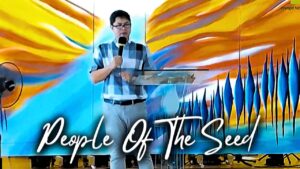Title: Sovereign Security
Scripture Reading: Psalms 91:1-8; 14-16
He that dwelleth in the secret place of the most High shall abide under the shadow of the Almighty.
2 I will say of the Lord, He is my refuge and my fortress: my God; in him will I trust.
3 Surely he shall deliver thee from the snare of the fowler, and from the noisome pestilence.
4 He shall cover thee with his feathers, and under his wings shalt thou trust: his truth shall be thy shield and buckler.
5 Thou shalt not be afraid for the terror by night; nor for the arrow that flieth by day;
6 Nor for the pestilence that walketh in darkness; nor for the destruction that wasteth at noonday.
7 A thousand shall fall at thy side, and ten thousand at thy right hand; but it shall not come nigh thee.
8 Only with thine eyes shalt thou behold and see the reward of the wicked.
Because he hath set his love upon me, therefore will I deliver him: I will set him on high, because he hath known my name.
15 He shall call upon me, and I will answer him: I will be with him in trouble; I will deliver him, and honour him.
16 With long life will I satisfy him, and shew him my salvation.
Augustus Toplady quotes this poem:
‘A Sovereign Protector I have,
Unseen, yet forever at hand,
Unchangeably faithful to save,
Almighty to rule and command.’
In Psalms 91, God’s security was not beneath him; it was above him.
Under this security – an incomparably sovereign security – the psalmist could move forward in his life with great confidence and efficiency.
To me, I can have this sure hope in the character of God: mercy.
Honestly this mercy is also manifested among the non-believer who hope in the mercy of God. ago.
Let us learn some truths about this Sovereign Security.
- Individualized God’s protection with His faithful followers
Psalms 91:1-4 says, “He that dwelleth in the secret place of the Most High Shall abide under the shadow of the Almighty. I will say of the LORD, He is my refuge and my fortress: My God; in him will I trust. Surely he shall deliver thee from the snare of the fowler, And from the noisome pestilence. He shall cover thee with his feathers, and under his wings shalt thou trust: His truth shall be thy shield and buckler.”
Often the Psalms speak to the Nation of Israel but this one is individualized: it mentions, indicates, and considers individually. You will notice the personal pronoun (he) an individual character is used. Psalms 91 particularize an individual. The truths of Psalms 91:1-8 are paralleled by Psalms 91:9-13. God’s care and provision are repeated for emphasis. Here, various names of Deity are used in Psalms 91:
- Most High (Elyon)
- Almighty (Shaddai) – This is a patriarchal name for God.
- LORD (YHWH) – the covenant name for Deity. This comes from the Hebrew verb ‘to be.’ This describes Deity as Savior, Redeemer.
- God (Eloah) – this is the general name for Deity. In plural form, Elohim is used. This describes God as creator, sustainer, and provider of all life on earth.
It is wonderful to be a child of God. You can have faith in this powerful God. There is sovereign security. The imagery of this Deity and His faithful followers is derived from the married life:
- ‘cleave’
- ‘know”
The secret place is derived from the imagery of ‘cleave’ and ‘know.’
Then Psalms 91:1-4 uses several images to describe His care and protection:
- Shelter – which denotes the Temple. The church is a shelter.
- Shadow – shadow as a metaphor for protection and care. This is an Old Testament imagery of shade and shadow of YHWH.
- Wings – this is used as shelter from evil people. Here we are reminded of the mother bird.
- Refuge – The verb form of ‘refuge’ denotes placing confidence and trust in something or someone.
All these descriptions designate the One (God) in whom faithful followers trust. He will deliver us from the snare of the trapper. He will deliver us from deadly pestilence: possibly demonic. He will cover them with His wings. Again, a metaphor for protection and care. His faithfulness is a shield – a bulwark or buckler (both military terms.) In this metaphor, the psalmist represented God’s faithfulness in guarding him from all harm like a shield and rampart, depicting God as protecting a warrior in the day of battle. All these are beautiful and powerful images of YHWH’s character and actions on behalf of His people.
- God speaks
Psalms 91:14-16 says, ‘Because he has loved Me, therefore I will deliver him. I will set him securely on high, because he has known my Name. He will call upon Me, and I will answer him. I will be with him in trouble. I will rescue him and honor him. With long life I will satisfy him. And let him see My salvation.’
To authenticate what was mentioned in Psalms 91:1-8, repeated for emphasis in Psalms 91:9-13, the LORD here personally speaks. Here God speaks in His Secret Place.
In Psalms 91:14-16 God speaks and thereby sets up an ‘If……then’ covenant blessing relationship. Please observe the God (then) believer (if) God’s blessings
- Deliver him if he loves (literally ‘cleave to). God perfectly will be with him in time of trouble.
- God will set him on high if he knows God’s name. God’s name will rescue him.
- God will answer him, if he calls upon God and honor him with long life and he will behold God’s salvation.
Note the various he (if) that was undertaken:
- He has set his love upon Me. This is used elsewhere in contexts of setting one’s heart on somebody or on some enterprise. A man’s commitment to God is shown here.
- To set one’s love upon God means to do it by choice. He does not wait for the feeling of love to come, but simply chooses to think and act toward God in ways that express and build love. This would include:
- Spending time with God
- Listening to God
- Thinking of God in unoccupied moments
- Adoring God
- Speaking of God to others
Our present culture often thinks of love as something that happens to people, not something chosen. The phrase ‘because he has set his love on Me,’ reminds us that a significant aspect of love is indeed a choice, and this describes in part the love we should give unto God.
The following is the then that God will do:
- Therefore, I will deliver him.
- I will set him on high: ‘I will place him out of reach of all his enemies. I will honor and ennoble him, because he had known my name – because he has loved, honored and served me. And rendered me that worship which is my due. He has known me to be the God of infinite mercy and love.
Here the psalmist quotes God as saying that the blessings are for those who love God and acknowledge His name, calls upon Him and seek satisfaction in what he alone can provide.
- He shall call upon Me, and I will answer him.
- I will be with him. Here God spoke personal and wonderful blessing over him:
- The blessing of His presence
- The blessing of His protection
- The blessing of His promotion
- The blessing of His prosperity
- The blessing of His preservation
In conclusion, this is both a troubling and triumphant Psalms. Troubling because contrary to Psalms 91, man is a picture of death. In Adam, the first man, we all die. We witness death everywhere. We see it on television, we hear it from our neighbors or even friends. We do not seem to have protection at all. We witnessed pestilence, demonic attacks, dangers and a short life. The first Adam is truly a picture of death. We prayed for healing only to hear silence.
We have the sentence of death in us throughout life. Why? Because we have forsaken God and went on our own willful ways. When things go wrong, we are like Job’s wife, cursed God and die. When bad things happen, we ask Why? We have no relationship with God at all. We are as people groping in the dark having no light. Even as Christians we do not dwell in the secret place of the Most High. Our problem is that we are there sometimes, but our stay is like it is a motel -only for a night or two at times. But God sent the second Adam, which is a picture of life. That is the triumphant story. Psalms 91 is a picture of life; hope, protection, promotion and preservation. The One who is depicted for us in Psalms 91 is Jesus himself. He is the perfect, holy, sinless Man. He always dwells in the secret place of the Most High. They say Psalms 91 is a picture of the LORD Jesus himself from heaven, a truly messianic psalm, and a psalm of life. Jesus came and everywhere he went, death is swallowed up. There is no death near his vicinity. There is no sickness around him because He would heal them. There is no death because he would raise them up. There is no bondage around him because he would set them free. Yet we saw the perfect Man, Jesus went into the jaws of death. He went down into the lowest part of the death, which meant death and the grave. Why? Because of man; a picture of death, he witnessed death for our sake. He went to the cross and was crucified. He was whipped so that by his stripes we can be healed. He died for our sakes, so that if you come to Jesus, your sins can be forgiven and your relationship can be restored. Deliverance came on the third day when God raised Christ from the dead and gave Him glory. God says, ‘I will set him on high.’ What a picture of Christ in this psalm. When Jesus was resurrected, he overcame the picture of death and gave you an opportunity to experience a picture of life. If you come to him today and surrender your life, he will restore you back into right relationship with God our heavenly Father and all these is that is mentioned in Psalms 91 can happed to you. But God has a condition: if you perform certain thing, then he will respond accordingly. No matter how far you have gone away from God, if you call upon him today, He will answer you. If you come back to him, he will give you the blessing of His presence, protection, promotion, and preservation. All this is possible because Jesus has already paid for our penalty and broken the picture of death and give you an opportunity to experience the picture of life. Jesus come to him.





